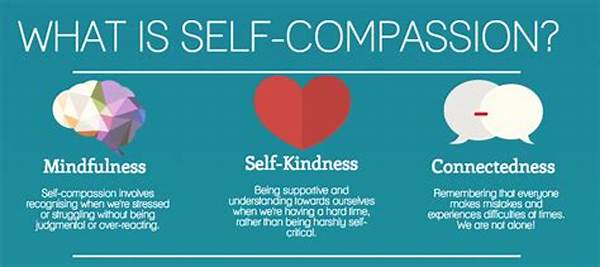In a world that often emphasizes external validation, self-compassion is the unsung hero that fuels true confidence. Imagine waking up each day and facing the world with a confidence that isn’t fragile and doesn’t depend on others’ opinions. True confidence arises from within, cultivated by the gentle art of self-compassion. It’s a mindset that allows us to be kind to ourselves, especially when we stumble or face challenges, embracing flaws as part of the journey rather than as failures. Just like a phoenix rising from its ashes, self-compassion fuels true confidence by allowing us to see setbacks as stepping stones.
Read More : How Millennials Use Mindfulness For Confidence
Self-compassion is vital for nurturing genuine confidence. When we talk about why self-compassion fuels true confidence, it’s crucial to acknowledge the difference it makes in our lives. Rather than harshly critiquing ourselves for every mistake, self-compassion encourages understanding and forgiveness. It’s about realizing that imperfection is part of being human—a perspective that shifts the focus from self-criticism to self-acceptance. Through this approach, our confidence isn’t shaken by external setbacks or internal doubts, making us more resilient and capable.
Furthermore, self-compassion provides the space to grow and learn. By treating ourselves with kindness, we’re more open to taking risks, as the fear of failure isn’t as paralyzing. When we fall, self-compassion acts as a safety net, re-engaging our inner motivation. It’s in this cycle of gentle growth that self-compassion fuels true confidence, allowing us to blossom into our best selves.
Building Resilient Confidence Through Self-Compassion
Asking why self-compassion fuels true confidence reveals an underlying secret: treating oneself kindly creates unshakeable resilience. By embracing self-compassion, individuals learn that making mistakes isn’t the end of the world but rather an opportunity for growth. As a result, faced with adversity, such individuals showcase confidence that is resilient—a confidence that stands strong against the harshest of storms, illuminating the path forward.
—
Description
At first glance, self-compassion might seem like an overly gentle approach in a world that often touts toughness and competition. However, understanding why self-compassion fuels true confidence reveals its profound impact not only on our self-esteem but also on our overall well-being. Imagine self-compassion as a nurturing garden, where seeds of true confidence are planted and cultivated with kindness, patience, and understanding. A well-known researcher, Kristin Neff, has dedicated her career to exploring the benefits of self-compassion, highlighting how it fosters resilience and authentic confidence.
The Link Between Self-Compassion and Inner Strength
Confidence, the elusive trait many chase after, isn’t genuinely achievable through external validation alone. It’s about what’s inside—it comes from being in tune with ourselves, acknowledging both our strengths and weaknesses. By asking why self-compassion fuels true confidence, we uncover how self-kindness transforms our self-perception. It’s not about pampering ourselves but growing a deep-rooted understanding and acceptance of who we are. This self-awareness builds a foundation of inner strength that is hard to topple.
Why Self-Compassion is Revolutionary
In today’s bustling environment, self-compassion is not merely a luxury; it’s a revolution of thought crucial for personal development. Adopting this mindset allows us to break away from the self-imposed chains of harsh criticism and judgment. We become our own allies, and this positive relationship with oneself sparks an inner revolution, shifting how we handle obstacles. It reveals how the gentle approach of self-compassion fuels true confidence, contrasting the superficial assurance derived from outward success.
Those who practice self-compassion find themselves better equipped to handle life’s challenges. By replacing self-criticism with self-kindness, we reframe failures as learning experiences rather than definitions of our worth. As we dissect why self-compassion fuels true confidence, it’s clear that embracing imperfections is the key. It’s about rewriting the narrative from “I’m a failure” to “I am learning.”
Ultimately, promoting self-compassion redefines how we interact with our internal dialogues. The change in perspective from self-loathing to self-love is subtle yet monumental. This change is why self-compassion fuels true confidence and encourages a mindset where confidence isn’t an act, but a lifestyle rooted in authenticity and self-awareness.
—
Key Takeaways
—
The Science Behind Self-Compassion and Confidence
Self-compassion might sound like a trendy buzzword, but it’s firmly rooted in psychological science. A growing body of research sheds light on why self-compassion fuels true confidence and its myriad benefits. Dr. Kristin Neff, a pioneer in the field, emphasized that self-compassion consists of self-kindness, recognition of common humanity, and mindfulness. These components are forms of self-care that spark internal motivation and perseverance, enhancing resiliency in the face of challenges.
Self-kindness acts as a soothing balm, calming our minds when faced with the discomfort of self-doubt or external criticism. Recognizing common humanity helps us understand that we aren’t alone in our struggles—everyone faces setbacks and imperfections. Mindfulness, meanwhile, encourages us to observe our thoughts and emotions without judgment, allowing for a balanced perspective. Together, they create a holistic framework for building confidence that doesn’t crumble under adversity.
Investigating why self-compassion fuels true confidence led researchers to discover that self-compassionate individuals show greater emotional resilience. The ability to maintain equilibrium in life’s ups and downs allows them to engage the world with poise and assertiveness, showcasing true confidence that isn’t easily shaken. This resilience also fosters a positive cycle: the kinder we are to ourselves, the more confident we become, and the more confident we feel, the kinder we tend to be—a rewarding cycle of development.
Thus, self-compassion empowers us not just to survive, but to thrive, fostering a robust sense of self-esteem and unshakable inner peace. In a fiercely competitive world, embracing self-compassion may be our secret weapon for success. So, as you embark on your personal journey, remember: why self-compassion fuels true confidence lies in its ability to foster growth, acceptance, and true joy.
Practical Steps to Cultivate Self-Compassion
Start Small and Be Consistent
Cultivating self-compassion doesn’t require a complete overhaul of your life. Start with small practices—like affirming your strengths or expressing gratitude for your efforts—that can sow seeds of self-compassion. Consistent practice will embed this mindset into your daily routines, gradually shifting your internal dialogue towards kindness and understanding.
Engage in Mindful Meditation
Mindful meditation is a powerful tool for nurturing self-compassion. It encourages you to pay gentle attention to your thoughts and emotions, helping you develop a non-judgmental awareness that’s critical for self-compassion. As you delve into why self-compassion fuels true confidence, mindful meditation provides clarity, reducing anxiety and promoting a calm, assured demeanor.
Finally, as Brene Brown famously said, “Talk to yourself like you would to someone you love.” Remember, you deserve the same kindness and understanding you readily give others. Embrace self-compassion as a lifelong journey toward authentic confidence, and you’ll find yourself facing life’s challenges with a newfound strength that truly stands the test of time.
—
Illustrations of Self-Compassion in Action
Understanding why self-compassion fuels true confidence reshapes our mindset towards growth and self-acceptance. As individuals, integrating self-compassion into daily life boosts both personal and professional dimensions. It’s this transformation that stabilizes true confidence, turning it into a pillar of strength, poise, and cheerfulness ingrained in our character.



